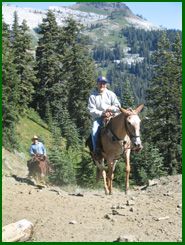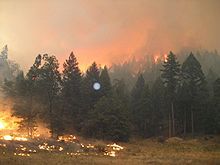Calif. regs killing lumber manufacturers
July 31, 2012
By Katy Grimes
California’s private forest lands are some of the most productive in the world. But state regulation of timber harvesting practices have become so overbearing and complex that the industry is losing lumber manufacturers by the droves, production has been drastically reduced and nearly 10,000 jobs have been lost.
California’s forest land permit fees are 10 times more expensive than the permits of land owners in neighboring states.
California is not only producing a fraction of the wood products consumed by the state. But the timber industry was forced into a compromise by the state and is actually asking for a 1 percent assessment to pay for a review of the process and to provide funds to help reduce the cost of forest restoration and fire protection.
What are the problems?
California Forestry Association President Dave Bischel said that the number one problem facing forest land owners is wildfire liability. A recent liability case was decided where the government handed a private land owner a bill for $791 million for 500,000 acres of fire damage. But according to the forestry association, that fire actually burned was 65,000 acres.
The Moonlight Fire ignited on Labor Day in 2007. The federal government lawyers said it was “a result of logging operations by industry giant Sierra Pacific Industries and its contractor.” But William Warne, the attorney for Sierra Pacific Industries, said SPI should not have been blamed for the fire because it didn’t start on SPI land, wasn’t started by any of its employees and its contractor’s workers weren’t even involved.
“The government’s lawyers were at the same depositions that we were; they saw the same investigative mistakes, the same hidden photographs and diagrams and the same buried or altered witness statements, so when the government tries to say today that Sierra Pacific’s operations started the fire, I am not sure what fire they are referring to,” Warne told the Record Searchlight.
“SPI apparently agreed to settle the case because U.S. District Court Judge Kimberly J. Mueller had ruled that SPI could be held liable for damages, even though the company was not responsible for starting the fire,” the Searchlight reported.
At issue is private land that butts up against government forest land–when a fire occurs, whether the private land owner caused it or not, Bischel said the fire becomes the liability of the private land owner if it damages any of the federal or state land. However, if a fire starts on the government-owned land, the government claims sovereign immunity, says that it’s not their fault and tells the private land owner that he is responsible for the damage to his own land.
“It’s a public trust issue, and why the public should be involved,” Bischel said. He also said that many of his members are being forced to seriously consider not allowing any more public access to their privately owned lands because of the position the government has taken on liability issues.
Bischel explained that, because California law is unclear, the federal government abandoned its traditional methods of assessing damaged land. It now seeks damages that are often seven times the fair market value of the forest land when a fire starts on private land and jumps to federal lands. It’s become a big money-making scheme for the government.
However, because the federal government doesn’t maintain its forest lands in anticipation of the fire season the way it requires private land owners to do, when a fire does threaten, the federal forest goes up in flames like a book of matches, Bischel said.
Bischel said that some of the laws have been on the books for more than 100 years and need to be reassessed. “All of California’s ecosystems are fire-adapted systems,” he said. “It’s a huge issue to maintain and manage lands with legal liability. It will lead to a lack of access if this continues.”
Bischel said that the other liability issue has been obtaining fire insurance. “Premiums have doubled and tripled in cost,” he said.
Regulatory burden
Bischel said that California now imports 70 percent of the lumber used by residents because of California’s impossible regulations. And, the cost structure for forest land owners because of the stringent environmental protections and heavy regulatory burden has rendered local lumber manufacturers non-competitive in California. This has caused more than 40 percent of the lumber manufacturers in California to close their doors in just 10 years.
Because of California’s efficient lumber-harvesting practices, the state’s private forest lands are some of the most productive in the world, and are growing more wood than is being cut, according to Bischel.
But the regulatory burden and often impossible environmental protections for forest land owners have grown exponentially. Twenty-seven lumber manufacturers have closed in the last 10 years, leaving only 36 manufacturers remaining.
Bischel said that regulation of timber harvesting practices, harvesting plans, non-industrial timber management plans, exemptions, and emergency notices for landowners have become so tedious and expensive, that the results have been disastrous and are killing off the state’s manufacturers.
Regulatory costs are measured per 1,000 board feet: California’s cost is $60 per 1,000 board foot; Oregon’s cost is $8 and Washington State’s is $9.
Environmental protections and harms
California landowners have some of the strictest and often nuttiest environmental protections foisted on them in the entire country. Forest land owners are the favored target of environmental protections and regulatory costs, now causing the state’s lumber to cost ten times more than that in neighboring states and counties.
Bischel said that the California Department of Finance and state regulatory agencies continue to seek more and more forest land owner fees from the state’s privately owned forest owners. Regulatory and legal uncertainty has led California forest land owners to often find other uses for their land, and close down timber harvesting businesses. Every manufacturing closure causes an increase in the price of lumber in California.
An example of the cost of California’s regulatory climate and burdens on the state’s manufacturers is the pencil industry. Once California produced 40 percent of the world’s pencils. But the last pencil manufacturer in California closed down in 1999 due to regulatory burdens, which caused skyrocketing costs.
California could easily produce one-half of the wood used in California, according to Bischel, if the regulations on forest land owners and manufacturers were not so many or costly.
Clean forest = clean air
One of the frustrating areas for Bischel is the push in the state for cleaner air. Bischel said that forests create carbon sequestration and are of great importance in the lowering of carbon emissions.
Terrestrial carbon sequestration is the process through which carbon dioxide from the atmosphere is absorbed by trees, plants and crops through photosynthesis, and stored as carbon in biomass (tree trunks, branches, foliage and roots) and soils, according to an explanation by the Environmental Protection Agency.
Bischel said that most of the forest and timber regulatory agencies in the state ignore this positive aspect of forest land. While the California Air Resources Board has acknowledged this important aspect of lowering carbon emissions, it seems that even the almighty CARB is unable to help California forest land owners out.
With the Legislature pushing more and more regulatory bills, Bischel worries that the once thriving California lumber industry will be forced to close down as most other California manufacturing has.
Three quarters of California’s privately owned forests are small landowners and small businesses. Without a streamlining process or even a regulatory reprieve, California’s remaining forest industry jobs will be pushed out-of-state.
Related Articles
Dems damn dams
JUNE 16, 2010 By KATY GRIMES With a win for PG&E but a loss for hydroelectric power plants in the
The Dark Side of Climate Activism
Feb. 23, 2012 Peter Gleick is a fraudster. The president and co-founder of the Oakland-based Pacific Institute for Studies in
Pravda laughs at American global warming hysteria
Jan. 6, 2012 By Katy Grimes Imagine my surprise when I found an article in Pravda mocking Western academics, scientists,




